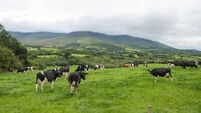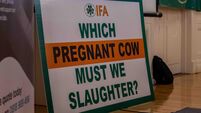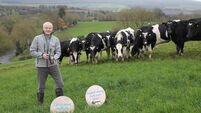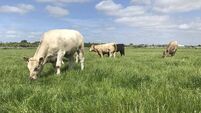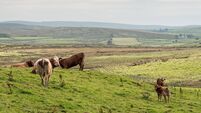Farmers protest in Cork as they seek flexibility only weeks before new nitrates rules

Farmers from around Munster and beyond gathered in Carrigaline on Friday morning. Picture: Larry Cummins
Up to 200 farmers protested in Cork to highlight the "real difficulties" that face them just weeks before changes to the nitrates derogation come into force.
Farmers from across southern Ireland gathered in Carrigaline bringing two dairy cows to march down the main street, stopping at the offices of Minister for Enterprise, Trade and Employment Simon Coveney and Minister for Finance Michael McGrath to hand in letters, before continuing their protest at Tánaiste Micheál Martin's office.
Farmers fear that to comply with nitrates rules and reduce their stock numbers by January 1, they will have to cull pregnant cows that are due to calve in the new year, which has been raised as a significant animal welfare issue by the Irish Farmers' Association (IFA).
The protest was organised by the IFA's Cork Central branch. Its chairman Conor O'Leary told the Irish Examiner that the European Commission is "allowing us no time" to become compliant and for farmers "to calve down these cows and then get them out of the system".
He said farmers put cows in-calf earlier this year, before they were aware of what would be required of them by the end of the year.
"Our ask is that we'll be allowed to calve the cows on our farms and have a logical, planned reduction," Mr O'Leary said, saying this would be the "moral" way to do it.
Mr O'Leary said the "obvious" solution would be that farmers on the new reduced limit could have a period of time to comply, such as 12 months to adjust their farms to the new limit.
While farmers are looking to Government to further negotiate with the commission and enact practical solutions, Mr O'Leary said that "we just don't have time to be waiting for someone to decide to look at this". "We need to do something here quick," he said.
This protest follows the recent visit of the EU Commissioner for Environment Virginijus Sinkevičius to Dublin, on foot of the commission's decision to cut Ireland's nitrates derogation from 250kg of organic nitrogen per hectare to 220kg from January 1 as a result of water quality trends.
Members of the IFA attended a meeting with the commissioner at the Department of Agriculture, an event which failed to bring about any flexibilities to the impending reduction. IFA national environment chairman Paul O’Brien said after the meeting that it is "completely unreasonable to expect farmers to reduce their stocking rate to 220kg by the end of this year" to comply with the January 1 timeline of implementation of the new rules.
"Farmers made the decision to put their cows in calf last spring before any decision was taken. It is unreasonable and not in line with good animal welfare to now expect farmers to cull these in-calf cows," Mr O'Brien said.
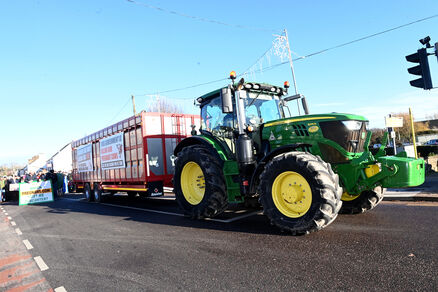
Other options for farmers aside from reducing cow numbers are obtaining more land, or exporting slurry. However, Mr O'Leary said exporting slurry is not as practical an option in Ireland as it is for other parts of Europe, and he feels that while politicians here "seem to understand" the dilemma, the European Commission's "diktat" is for farmers to "just suck it up and get there by January 1".
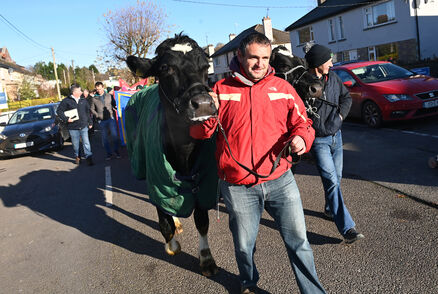
"What we're really concerned about is that it looks like our Government has no say in how Europe is going to regulate us," Mr O'Leary said.
"This is why we wanted the commissioner to come and see what we do.
"To have him come to Dublin and not go outside Dublin was a real let-down and it looks to us that our Government ministers have no say in Europe anymore."
Mr O'Leary added that farmers are "resilient", and are used to dealing with "disappointment", but that Government must fight for them on this to save the industry.
